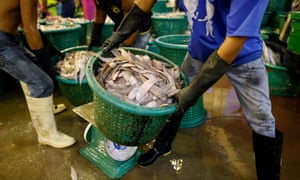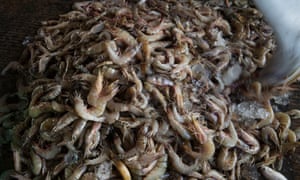Thai seafood: are the prawns on your plate still fished by slaves?
Report finds trafficking persists on Thai fishing boats, as campaigners challenge supermarkets to guarantee products are free of rights abuses
Thailand’s billion-dollar seafood export industry remains infested with human rights abuses despite government pledges to stamp out slavery in its fishing industry, according to research by Human Rights Watch.
Four years after damning revelations of chattel slavery aboard Thai fishing boats linked to seafood exported and sold by major retailers around the world, a report says that rights violations in one of Thailand’s major export industries continue unabated, including forced labour and widespread human trafficking.
For the report HRW conducted interviews with 248 current and former Burmese and Cambodian fishermen as well as Thai officials, boat owners, local activists and United Nations agency staff over a two-year period in all of Thailand’s major fishing ports.
It documented how migrant fishermen from south-east Asia continue to be routinely trafficked on to fishing boats, prevented from leaving or changing employers, and are often not paid for their work or paid less than the minimum wage.
“What the report found was that although this military government has taken more positive steps forward than the last, the reforms that have been put in place are still largely cosmetic,” said Brad Adams, director of Human Rights Watch in Asia.
“Forced labour is routine. The workers we interviewed described being trafficked on to ships, trapped in jobs they couldn’t leave, physical abuse, lack of food, long hours and awful working conditions. The worst thing for many of them was not being paid – the psychological harm and final indignity was the hardest to bear.”
Steve Trent, chief executive of the Environmental Justice Foundation (EJF), who has been working with the Thai government on its reforms, said the focus should also be on ensuring that those selling seafood to consumers take responsibility for ensuring supply chains are free from rights abuses.
“There is no shadow of a doubt that widespread and very serious labour violations are continuing throughout the industry,” said Trent. “Buyers and retailers have failed comprehensively to play their part in finding a real solution.”
He said the creation of the Sustainable Seafood Taskforce had failed to live up to its promises: the industry body, made up of supermarkets, buyers and retailers sourcing seafood from Thailand, was set up in 2015 to bring transparency and accountability to their supply chains.
“Never in my career have I seen a process more focused on talking in hotel rooms in Bangkok rather than actually committing to using their influence to create real change,” he said.
“I challenge any of the retailers selling Thai seafood to consumers to guarantee that products from Thailand are free from human rights abuses and illegal fishing. They have arguably more power than anyone else and they are failing to use it.”
The Sustainable Seafood Taskforce did not respond to a request for comment.
A major investigation by the Guardian in 2014 exposed brutal cases of slavery aboard Thai fishing boats feeding trash fish – inedible or infant species of fish to be ground into fishmeal – into the supply chain of prawns sold by supermarkets in the UK, Europe and United States.
In 2015 the European Union imposed a “yellow card” on Thailand under its illegal, unreported and unregulated (IUU) fishing framework, threatening to ban Thai fisheries imports if the government failed to clean up its fishing industry, including labour rights violations.
The Thai government responded with a broad programme of reforms including new laws to regulate and improve working conditions, documentation and wages for migrant fishermen. A “port-in, port-out” (Pipo) system was also created to require boats to report for inspections, as well as limiting time at sea to 30 days.
However, HRW said that although some progress had been made, the persistence of trafficking and forced labour on fishing boats illustrated that many of the reforms were cosmetic.
The report said that the labour inspection regime was largely a “theatrical exercise for international consumption” and that in 2015 Thailand failed to find a single case of forced labour in inspections of 474,334 fishing crew.
The group is now urging the European Union to continue using the IUU framework to keep the pressure on the Thai government to address trafficking and slavery at sea.
“Although we understand that the IUU is designed to focus on fishing stocks and environmental issues, we’re really concerned that a move to address human rights concerns outside the IUU framework means that we will lose the only real effective tool that the EU had to address trafficking and forced labour in the Thai seafood industry,” said Adams.
Luisa Ragher, deputy of the delegation of the European Union in Thailand, said that the EU is committed to working alongside the Thai government to tackle labour rights violations.
“The government of Thailand has given high priority to this and put significant effort into addressing these problems. There are still shortcomings but progress has been made and we are confident of their commitment to improving things,” she said. “We are working intensively at opening up a broader discussion on labour rights that extends past fishing into other sectors.”



No comments:
Post a Comment